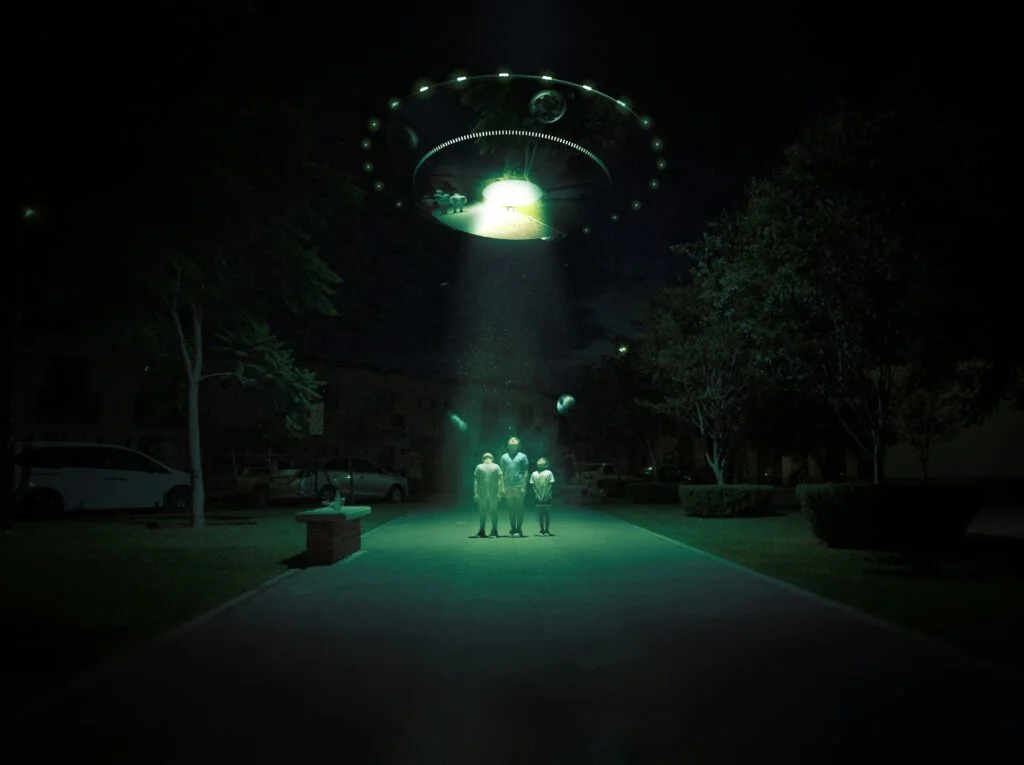UFO Town Origins
The origins of this tiny town, renowned for its UFO culture, can be traced back several decades. The initial spark that ignited the community’s fascination with extraterrestrial phenomena occurred in the late 1940s, when a series of supposed UFO sightings were reported in the vicinity. These early accounts of unidentified flying objects captured the attention of local residents and sparked a wave of curiosity that would shape the town’s identity for years to come.
Historical records indicate that the town was first recognized as a hotspot for UFO activity following a string of unusual incidents. One notable event occurred in 1952, when multiple witnesses claimed to have observed bright lights dancing across the night sky. This event not only drew media attention but also began attracting UFO enthusiasts and researchers from outside the town, eager to investigate the phenomenon. As word spread about these incidents, the town earned its nickname as a UFO haven, further solidifying its place in UFO lore.
Alongside the documented sightings, various local beliefs and legends have emerged, enriching the town’s narrative. Residents often recite tales of alien encounters and mysterious craft that have not been substantiated by scientific evidence, yet continue to spark interest and intrigue. The influence of folklore is evident in local celebrations, which often include themed events surrounding UFOs and extraterrestrial beings. Such traditions foster a sense of community and contribute to the town’s ongoing reputation as a focal point for UFO-related activities.
In recent years, the town has become a pilgrimage destination for those curious about UFOs, blending history, myth, and the allure of the unknown. The legacy of its origins remains palpable, as both locals and visitors continue to explore the countless stories and mysteries tied to the town’s unique extraterrestrial attraction.
What Happens at the Festival
The UFO Festival is an engaging tapestry of activities that highlight both the whimsical and educational aspects of the extraterrestrial theme. One of the most vibrant elements of this festival is its grand parade, which sets the tone for the entire event. Participants don elaborate costumes, ranging from classic alien figures to creative interpretations of famous sci-fi characters. The streets come alive with music and dance, inviting both locals and visitors to join in the celebration as floats adorned with cosmic decorations traverse through the town.
Beyond the festivities of the parade, attendees can immerse themselves in a series of informative lectures and workshops led by experts in the fields of astronomy, UFO research, and conspiracy theories. These sessions are designed to provoke thought and discussion, inviting questions from the audience. Notable speakers often include scientists, authors, and enthusiasts who share their insights and latest research findings which keep the audience engaged and curious about the broader implications of extraterrestrial phenomena.
Food at the UFO Festival is equally impressive, featuring a range of alien-themed dishes that delight the palate and imagination. From green-hued snacks to creatively named beverages, the culinary offerings aim to enhance the out-of-this-world experience. The festival also fosters community engagement through various gatherings, parties, and themed events that encourage participation and interaction, creating a collective atmosphere of joy and celebration. As people of all ages gather to share their experiences, the festival cultivates a spirit of unity and excitement that celebrates both the mysterious allure of UFOs and the charm of community connection.
I Joined the Believers
As I arrived at the UFO festival, the atmosphere was electric with anticipation and camaraderie among the attendees. This small town, known for its quirky devotion to extraterrestrial phenomena, transformed into a vibrant hub of believers. Early on, I observed various booths and tents, each offering a unique take on the mysteries of the universe. This gathering was not merely an event; it represented a collective of individuals, all sharing a profound belief in the existence of unidentified flying objects.
During my time at the festival, I had the opportunity to engage with numerous locals and visitors, many of whom had compelling accounts of their personal encounters with UFOs. One gentleman, who identified himself as a long-time enthusiast, recounted a vivid experience he had while camping in the nearby woods. His story painted a picture of awe and fear, illustrating how impactful such encounters can be on an individual’s life. Listening to these anecdotes offered me an insider’s perspective on the emotional investment that fuels this community’s passion.
In addition to personal stories, I attended a session held by an ‘abduction support group.’ This unique initiative allowed participants to share experiences, seek counseling, and foster connections with others who have experienced similar phenomena. It became apparent that the emotional aspects of the festival went far beyond entertainment; it served as a safe space for individuals to express their doubts, fears, and various beliefs regarding UFOs. The shared sense of belonging created a communal bond among attendees, reinforcing their convictions and providing solace in shared experiences. Engaging with these believers enriched my understanding of their perspective and the significance of the festival in their lives.
Truth or Tourist Trap?
The phenomenon of UFO tourism has gained significant traction in various regions, with towns claiming a rich history of extraterrestrial encounters. Within this intriguing niche, the UFO Festival occupies a unique position. While visitors are drawn in by the allure of alien life and unexplained phenomena, it is essential to critically examine the legitimacy of such beliefs against the backdrop of scientific inquiry. Many skeptics argue that the festival may cater more to tourism than to genuine ufological interest.
Interviews with experts in the field of ufology reveal a spectrum of opinions regarding UFO sightings. Some researchers postulate that many reported encounters can be attributed to misidentified aircraft, atmospheric phenomena, or even psychological factors influencing perceptions. They suggest that urban legends and anecdotal evidence often overshadow the scientific method, which demands rigorous investigation. This raises a pressing question: does the town genuinely serve as a hub for believers, or is it capitalizing on its notoriety for profit?
Conversely, UFO enthusiasts emphasize the importance of such festivals in fostering community and fostering dialogue about the unexplained. They argue that the festival encourages curiosity and promotes a culture of inquiry, giving a platform for diverse viewpoints on unidentified aerial phenomena. However, the contrasting perspectives ensure that debates surrounding the authenticity of UFO claims persist.
While the festival undoubtedly attracts thousands of visitors, an objective lens reveals a potential dichotomy between genuine belief and mere exploitation of a marketable idea. Balancing the facts with the fervor of belief is paramount in understanding the true nature of this town’s attraction. Ultimately, whether viewed as a genuine mecca for UFO believers or a cleverly crafted tourist trap, the festival continues to captivate the imaginations of many, intertwining the realms of fascination and skepticism.
Economic Impact of the Festival
The annual UFO Festival has a significant economic impact on the small town where it takes place, attracting visitors from various regions to partake in the festivities. Over the years, the festival has grown in popularity, drawing thousands of attendees. According to recent estimates, the event attracts around 10,000 visitors annually, particularly during the summer months, leading to a considerable boost in local tourism.
This influx of visitors presents an opportunity for local businesses to capitalize on the increased foot traffic. Hotels, restaurants, and retail stores, which often experience a lull in business outside the festival season, see remarkable spikes in revenue. For instance, local hotels report occupancy rates nearing 100% during the festival weekend, with many establishments booking rooms months in advance. Similarly, restaurants benefit from this surge, as attendees seek dining options before and after the scheduled activities.
The festival’s impact is not limited to direct spending on accommodations and meals; it also extends to local artisans and vendors. Many small businesses set up booths at the festival, allowing them to showcase and sell their goods. This marketplace not only facilitates sales but also helps to promote local crafts and products, thereby fostering community pride and engagement.
Furthermore, the economic benefits of the festival can be observed in the increased engagement of community members. Local organizations often take part in planning and executing festival activities, which enhances community cohesion and supports volunteer opportunities. This sense of community engagement has long-term benefits, fostering a positive environment that encourages further tourism-related events and activities.
In conclusion, the UFO Festival significantly bolsters the local economy, promoting business growth and community involvement, while enhancing the town’s visibility as a tourist destination.
Community Involvement
The annual UFO Festival serves as a significant focal point for community involvement, uniting residents and instilling a profound sense of belonging. The festival transcends mere entertainment; it fosters collaboration among local stakeholders including organizers, volunteers, and community members who dedicate their time and effort to ensure its success. The planning process involves a diverse array of individuals who contribute their unique skills and perspectives, reflecting the vibrant tapestry of the town.
Local organizers spearhead the logistics, managing everything from securing permits to coordinating activities that engage attendees of all ages. These dedicated individuals frequently emphasize the importance of inclusivity, aiming to create an event where every resident feels welcome and valued. Their efforts not only enhance the festival experience but also strengthen interpersonal relationships within the community. Volunteers, often comprising families and students, play a crucial role by assisting with various tasks such as registration, décor setup, and event management. Their enthusiasm and commitment bring an infectious energy to the festival, making it a truly collective endeavor.
Community members, irrespective of age or background, find opportunities for involvement that inspire participation. Workshops, presentations, and interactive exhibits provide a platform for local talent, showcasing art, science, and culture related to the UFO phenomenon. This engagement nurtures creativity while allowing individuals to take pride in their contributions. The collaborative spirit is palpable, further solidifying community ties as attendees celebrate their shared interests and experiences. Participating in this festival has the power to convert casual observers into investing members of the community, reinforcing the significance of the UFO Festival as not only a gathering for enthusiasts but as a catalyst for community bonds.
Alien Culture in Popular Media
The fascination with extraterrestrial beings and unidentified flying objects (UFOs) can be significantly traced through various facets of popular media, shaping and reflecting public perception. From the early 20th century, science fiction literature laid the groundwork for audiences to explore their curiosity about alien life. Classic works, such as H.G. Wells’ “The War of the Worlds” and Arthur C. Clarke’s “Childhood’s End,” introduced readers to the potential existence of advanced extraterrestrial civilizations. These narratives not only deepened the intrigue surrounding UFO phenomena but also influenced how people interpret their experiences and the lore surrounding sightings.
As cinema evolved, it became a powerful medium for broadcasting alien culture to mass audiences. Iconic films, such as “E.T. the Extra-Terrestrial” and “Close Encounters of the Third Kind,” have contributed to a more nuanced cultural representation of aliens, portraying them not only as potential threats but also as beings capable of friendship and understanding. The impact of these portrayals is robust; they evoke emotional responses that resonate with audiences, subsequently directing their beliefs and attitudes toward UFO-related events, including festivals that celebrate such phenomena.
Furthermore, television shows like “The X-Files” and “Stranger Things” explore conspiracies and the societal implications of UFO sightings, reigniting interest in mysterious occurrences. These representations instigate conversations about governmental transparency and the unknown, fostering a community of enthusiasts who gather at events like the UFO Festival. Attendees often arrive with preconceived notions shaped by their media consumption, thereby reinforcing both their beliefs and the communal atmosphere of such festivals. The intertextual relationship between popular media and real-life UFO events underscores the powerful influence of storytelling in shaping cultural perceptions of aliens and their continued relevance in contemporary society.
Visitors’ Tips for Attending the Festival
When planning a visit to the UFO Festival, timing is critical to ensure an enriching experience. The festival typically occurs during the summer months, attracting a diverse crowd eager to celebrate all things extraterrestrial. As hotel accommodations can fill up quickly, it is advisable to book your stay well in advance. Locations near the festival venue often offer special packages, including festival tickets, providing both convenience and value.
To maximize your experience, familiarize yourself with the festival schedule; this includes keynote speakers, panel discussions, and entertainment. Engaging in these activities will not only provide insight into UFO phenomena but also present opportunities to connect with fellow enthusiasts. Additionally, certain events may require pre-registration, ensuring participation in popular discussions with experts.
While at the festival, ensure to explore the must-see attractions that commemorate the UFO lore of the area. Exhibits displaying UFO art, historical documents, and local tales enrich the narrative of the festival, making it a memorable educational experience. Food stalls featuring local cuisine often pop up during the event, so be sure to indulge in the regional flavors while taking breaks between activities.
Engaging with vendors is also a noteworthy aspect of the UFO Festival. Many local artisans showcase extraterrestrial-themed crafts and merchandise, providing unique souvenirs to remember your visit. Taking the time to converse with the creators can enhance your understanding of the community’s passion for UFO culture.
Lastly, allow ample time to relax and enjoy the atmosphere. Festivals are often lively, filled with costumes and creativity. Embracing the unique ambiance will make your trip enjoyable and unforgettable. Following these tips will help you prepare for an extraordinary experience at the UFO Festival.
Future of the UFO Festival
The UFO Festival has firmly established itself as a prominent event in the cultural landscape, attracting both local residents and a multitude of visitors fascinated by the mysteries of extraterrestrial life. As we look to the future, several potential developments may shape the direction of this unique celebration, enhancing its relevance and appeal in the coming years. One significant possibility is the expansion of festival activities. With the increasing popularity of science fiction and alien-themed entertainment, organizers might consider introducing new elements, such as workshops, exhibitions, or guest speakers from the scientific community. Engaging with experts in astronomy, astrophysics, and even psychology could foster informative discussions regarding the broader implications of UFO phenomena.
Moreover, as societal interest in UFOs continues to rise, we can anticipate a considerable increase in attendance numbers. This growth could be further fueled by a burgeoning online community of UFO enthusiasts, who frequently exchange ideas and experiences. Enhanced promotional strategies utilizing social media platforms might encourage even greater participation, transforming the small-town festival into a major annual attraction. Such growth would hold significant implications for the local economy, potentially leading to increased business opportunities for local vendors and service providers.
Additionally, the evolving perspectives of the community on UFOs and associated phenomena could further impact the festival’s future. As more people become open to discussing and exploring these topics, the festival could transition from a niche gathering to a mainstream celebration of curiosity and inquiry. This cultural shift may provoke critical conversations about our understanding of the universe and humanity’s place within it. By fostering an inclusive atmosphere that invites diverse viewpoints, the UFO Festival will not only endure but thrive as an important junction for both believers and skeptics alike.

It could cover a range of topics related to health, wellness, beauty, personal growth, and social issues, all from the perspective of striving for beauty, intelligence, youthfulness, and impartiality





